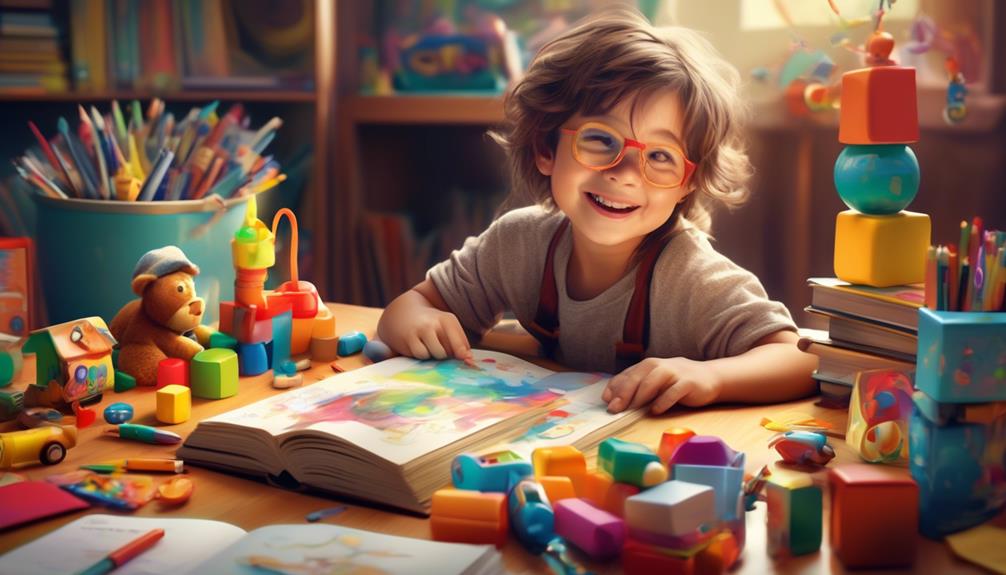Do These Things to Prepare Your Child for Kindergarten

Prepare Your Child for Kindergarten with These Essential Steps for Success.
- Establish a daily routine.
- Foster a love for learning.
Making the transition to kindergarten a breeze is all about setting your child up for success. By following these essential steps, you can ensure that your little one is well-prepared for this exciting new chapter in their education.
First and foremost, it's important to establish a daily routine. Kindergarten is a structured environment, and having a consistent schedule at home can help your child adjust more easily. Set regular times for waking up, eating meals, and going to bed. This will help your child develop good habits and a sense of responsibility.
In addition to a daily routine, it's crucial to foster a love for learning in your child. Encourage their curiosity and provide them with opportunities to explore and discover new things. Read to them regularly and engage in educational activities together. This will not only help them develop important skills but also instill a lifelong love for learning.
By taking these essential steps, you can ensure that your child enters kindergarten with confidence and enthusiasm. With a solid foundation in place, they will be ready to thrive academically and socially in this new and exciting environment.
Establish a Daily Routine
To ensure a smooth transition into kindergarten, it's crucial to establish a daily routine for your child. By doing so, you can encourage healthy habits and help them develop a sense of structure and responsibility.
One important aspect of the daily routine is establishing a homework routine. This will teach your child the importance of completing their assignments on time and help them develop good study habits from an early age.
Start by setting aside a specific time for homework each day. This could be right after school or before dinner, whichever works best for your family. Create a quiet and comfortable workspace for your child, free from distractions. Make sure they've all the necessary supplies, such as pencils, paper, and a designated homework folder.
During the homework time, offer guidance and support as needed, but also encourage independence. Let your child take ownership of their assignments and encourage them to ask questions if they need help. By establishing a consistent homework routine, you're teaching your child valuable skills that will benefit them throughout their academic journey.
In addition to homework, it's also important to establish other healthy habits in your child's daily routine. Encourage regular bedtime and waking up times to ensure they get enough rest. Incorporate time for physical activity, such as playing outside or participating in sports. Provide balanced meals and snacks to nourish their growing bodies.
Encourage Independence and Self-Help Skills
Now that you have established a consistent homework routine, it's time to empower your child by encouraging independence and self-help skills. Kindergarten is a big step, and promoting self-reliance will help your child adjust smoothly.
One way to encourage self-care is by teaching them basic hygiene habits. Show them how to wash their hands properly, brush their teeth, and take care of their personal belongings. By doing this, you're instilling a sense of responsibility and independence in them.
Another important aspect of self-help skills is teaching your child to dress themselves. Start by letting them choose their clothes for the day and then guide them through the process of putting them on. This won't only help them develop their fine motor skills but also boost their confidence.
Promoting self-reliance also means giving your child the opportunity to make choices. Allow them to choose their own snacks or decide on activities for the day. This won't only make them feel important but also foster decision-making skills.
Develop Social and Emotional Skills
Now it's time to focus on developing your child's social and emotional skills to prepare them for kindergarten.
Building empathy and cooperation are important skills that will help your child navigate social interactions and develop positive relationships with their peers.
Teaching them how to manage their emotions effectively will also give them the tools to handle challenging situations and adapt to new environments.
Building Empathy and Cooperation
As your child prepares for kindergarten, developing social and emotional skills such as empathy and cooperation is crucial for their overall success and well-being. These skills not only help them build positive relationships with their peers and teachers but also lay the foundation for their future social interactions.
Here are three practical ways to promote empathy and cooperation in your child:
- Encourage them to take turns and share their toys with others. This helps them understand the importance of cooperation and fosters a sense of fairness.
- Teach them to actively listen and show empathy towards others' feelings. By acknowledging and understanding different emotions, they can develop a greater sense of empathy.
- Model kindness and compassion in your own actions. Children learn by observing, so by demonstrating acts of kindness, you're showing them how to treat others with respect and empathy.
Managing Emotions Effectively
To effectively manage emotions and develop social and emotional skills, it's important for your child to learn how to identify and regulate their feelings in a healthy and productive way.
Managing stress and practicing emotional regulation are crucial skills that will benefit your child not just in kindergarten, but throughout their life.
Encourage your child to express their emotions and validate their feelings.
Teach them simple strategies to calm down when they're feeling overwhelmed, such as taking deep breaths or counting to ten.
Help them develop problem-solving skills by talking through challenging situations and brainstorming possible solutions.
Creating a safe and supportive environment at home will also contribute to their emotional well-being.
Foster a Love for Reading and Writing
Developing a love for reading and writing in your child is a crucial step towards preparing them for kindergarten. Not only does it open up a whole new world of knowledge and imagination, but it also helps them develop essential skills that will benefit them throughout their academic journey.
Here are three reasons why fostering a love for reading and writing is so important:
- Building strong foundations: When you read to your child and encourage them to write, you're laying the groundwork for their future learning. Children who are exposed to books and writing early on have a head start in developing language and communication skills.
- Boosting cognitive development: Reading and writing stimulate your child's brain and enhance their cognitive abilities. It helps them learn to think critically, problem-solve, and express their thoughts and ideas effectively.
- Fostering a lifelong love for learning: By instilling a love for reading and writing in your child, you're nurturing a lifelong passion for learning. They'll grow up to be curious, inquisitive individuals who actively seek knowledge and are eager to explore new ideas.
Practice Basic Math Concepts and Problem-Solving Skills
Discover the power of play in sharpening your child's math skills and problem-solving abilities. Math games and problem-solving activities aren't only fun but also essential in preparing your child for kindergarten. These activities help build a strong foundation in basic math concepts and develop critical thinking skills.
Engaging in math games allows your child to practice counting, number recognition, and basic operations such as addition and subtraction. You can use everyday objects like toys or fruits to make the learning experience more interactive. For example, encourage your child to count how many blocks they've or ask them to add two apples to three apples.
Problem-solving activities, on the other hand, teach your child to think critically and find solutions to challenges. Puzzles, shape recognition games, and building blocks are great tools for enhancing problem-solving skills. They encourage your child to analyze, strategize, and think outside the box.
Integrating math into your child's playtime not only makes learning enjoyable but also helps them understand abstract concepts in a practical manner. By incorporating math games and problem-solving activities into their daily routine, you're setting them up for success in kindergarten and beyond.
Boost Fine and Gross Motor Skills
Now that your child has honed their math skills and problem-solving abilities through engaging activities, it's time to focus on boosting their fine and gross motor skills. These skills are crucial for your child's overall development and will greatly benefit them as they enter kindergarten.
Here are three fun and effective ways to enhance your child's motor skills:
- Sensory play: Engaging in sensory play activities such as playing with sand, water, or playdough can help your child improve their fine motor skills. They'll learn to manipulate and control objects, enhancing their hand-eye coordination and finger strength. Encourage them to explore different textures, shapes, and sizes to stimulate their senses and promote dexterity.
- Outdoor activities: Spending time outdoors not only allows your child to burn off energy but also helps strengthen their gross motor skills. Activities like running, jumping, climbing, and riding a bike all contribute to their muscle development, balance, and coordination. Encourage them to engage in active play in the park, playground, or even in your backyard.
- Art and craft projects: Engaging in art and craft projects not only stimulates your child's creativity but also improves their fine motor skills. Activities like coloring, cutting, and gluing help them develop hand strength, control, and precision. Encourage them to explore different art materials and provide opportunities for them to express themselves through artistic creations.
Introduce Basic School Rules and Expectations
Now that your child is getting ready for kindergarten, it's important to start introducing them to the basic school rules and expectations.
This will help them understand how to behave in class and follow the school procedures.
Rules and Expectations
As your child prepares to enter Kindergarten, it's important to introduce them to the basic rules and expectations they'll encounter in their new school environment. This will help them understand the importance of establishing boundaries and teaching responsibility from an early age.
Here are three key rules and expectations to discuss with your child:
- Be respectful: Teach your child to treat their teachers and classmates with kindness and respect. Encourage them to listen when others are speaking and to use polite language.
- Follow instructions: Help your child understand the importance of following instructions given by their teacher. Explain that this will help them learn and stay safe in the classroom.
- Take responsibility for belongings: Teach your child to be responsible for their own belongings, such as their backpack and lunchbox. Emphasize the importance of keeping their things organized and taking care of them.
Behavior in Class
To ensure a successful transition to Kindergarten, it's essential to introduce your child to the basic rules and expectations that will shape their behavior in the classroom. Classroom discipline and behavior management are crucial aspects of a child's learning experience.
Start by explaining the importance of listening to the teacher and following instructions. Teach them to raise their hand when they've something to say, instead of interrupting others.
Emphasize the significance of being respectful to their classmates and teachers, and encourage them to share and take turns. It's also important to teach them about personal space and the importance of keeping their hands to themselves.
Following School Procedures
Start by familiarizing your child with the basic school rules and expectations that will guide their behavior in the classroom. This will help them establish good communication skills and develop listening skills, which are crucial for their success in kindergarten.
Here are three important rules to teach your child:
- Respect others: Encourage your child to treat their classmates and teachers with kindness and respect. Remind them to listen when others are speaking and wait their turn to speak.
- Follow instructions: Teach your child the importance of following instructions from their teacher. Help them understand that by doing so, they'll be able to participate fully in class activities and learn effectively.
- Take turns: Kindergarten often involves group activities and sharing. Teach your child the concept of taking turns and waiting patiently for their chance to participate.
Create a Positive Attitude Towards Learning
Encourage your child's curiosity and love for learning by fostering a positive attitude towards education and exploration. A positive attitude towards learning not only sets the stage for academic success but also helps develop essential life skills. Here are some practical ways to cultivate a positive mindset in your child:
| Encourage | Avoid |
|---|---|
| Celebrate achievements, no matter how small. | Criticizing mistakes or failures. |
| Provide opportunities for hands-on learning experiences. | Overemphasizing grades or performance. |
| Praise effort and hard work, rather than just results. | Comparing your child to others. |
| Make learning fun through games, activities, and play. | Creating a stressful or pressure-filled learning environment. |
By creating a positive learning environment, you can help your child develop a growth mindset and a love for learning. A growth mindset focuses on the belief that abilities and intelligence can be developed through effort and practice. This mindset encourages children to embrace challenges, persist in the face of setbacks, and see mistakes as opportunities for growth. It also fosters a sense of curiosity and a willingness to explore new ideas and concepts.
Incorporate these strategies into your daily routine to promote a positive attitude towards learning. By doing so, you will not only prepare your child for kindergarten but also lay a strong foundation for their future academic and personal success.
Frequently Asked Questions
What Are Some Strategies for Helping My Child Develop Social and Emotional Skills Before Starting Kindergarten?
To help your child develop social and emotional skills before kindergarten, try teaching empathy and conflict resolution strategies. Additionally, focus on building resilience and coping skills. These techniques will prepare them for the challenges they may face in kindergarten.
How Can I Encourage My Child to Become More Independent and Develop Self-Help Skills?
You can help your child become more independent and develop self-help skills by giving them opportunities to make choices, allowing them to complete tasks on their own, and praising their efforts.
What Are Some Ways I Can Foster a Love for Reading and Writing in My Child Before They Start Kindergarten?
To foster a love for reading and writing in your child before kindergarten, make it a fun and interactive experience. Read together, ask questions, and let them express themselves through drawing and storytelling. Encourage creativity and make learning enjoyable.
How Can I Help My Child Practice Basic Math Concepts and Problem-Solving Skills Before Kindergarten?
Want your child to excel in math? Start early! Engage in number sense activities like counting toys. Boost problem-solving skills with fun games. Prepare them for kindergarten success!
What Are Some Activities or Exercises That Can Help Boost My Child's Fine and Gross Motor Skills Before They Start Kindergarten?
Engage your child in activities that boost their fine and gross motor skills. Encourage sensory play for motor skill development. These exercises will prepare them for kindergarten and promote their overall physical development.











